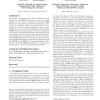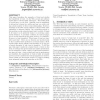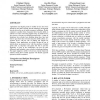ACMICEC
2006
ACM
14 years 5 months ago
2006
ACM
We present a browser-extending Semantic Web extraction system that maps HTML documents to tables and, where possible, to rules. First, the basic data extractor ViPER distills and ...
ACMICEC
2006
ACM
14 years 5 months ago
2006
ACM
ACMICEC
2006
ACM
14 years 5 months ago
2006
ACM
The growth of mobile commerce will require development of both demand and supply sides of the market. On the supply side, the development of mobile applications (e.g. games, calen...
ACMICEC
2006
ACM
14 years 5 months ago
2006
ACM
In this paper we present a proposal for representing soft constraint satisfaction problems (CSPs) within the Semantic Web architecture. The proposal is motivated by the need for a...
ACMICEC
2006
ACM
14 years 5 months ago
2006
ACM
As third party logistic services become popular, the role of software agents increases in importance in terms of the logistics scheduling of buyers and sellers. To support many mo...
ACMICEC
2006
ACM
14 years 5 months ago
2006
ACM
Auction mechanism design has traditionally been a largely analytic process, relying on assumptions such as fully rational bidders. In practice, however, bidders often exhibit unkn...
ACMICEC
2006
ACM
14 years 5 months ago
2006
ACM
This paper formalizes the semantics of trust and studies the transitivity of trust. On the Web, people and software agents have to interact with “strangers”. This makes trust ...
ACMICEC
2006
ACM
14 years 5 months ago
2006
ACM
Applications and digital goods for mobile devices have been around for more than a decade. Recent technology development has also driven the use of mobile commerce technology. Mob...
ACMICEC
2006
ACM
14 years 5 months ago
2006
ACM
This paper addresses a problem in supply chain management that how scarce resources can be efficiently allocated among competing interests. We present a formal model of allocation...
ACMICEC
2006
ACM
14 years 5 months ago
2006
ACM
Supply chains are a central element of today’s global economy. Existing management practices consist primarily of static interactions between established partners. Global compet...



